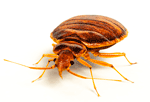(720)990-5566
-
I just went on a business trip and have not noticed any bites, am I in the clear?
-
When I travel, how can I prevent from bringing bed bugs home?
-
Bed bugs are hitchhikers. It is very easy to bring them into your home or transport them to other areas
-
They are drawn to heat, il2 and other elements which their victims give off.
-
A vacation or business trip are two of the common ways to bring bed bugs home.
I just went on a business trip and have not noticed any bites, am I in the clear?
-
It might take you many weeks even months to notice you have brought bed bugs into your home.
-
The issue has already established itself in your home by the time you see that you have been bitten.
-
The tell-tale signs will be the first indicator that you have bed bugs.
-
By withdrawing blood from their hosts. When they expel the fecal liquid, it is dark red in color. These are the stains that you notice in areas with bed bugs.
-
Bed bugs can feed on your pets if there is no human host available.
-
The face, neck, upper torso, arms and hands are the areas where they commonly bite. An adult bed bugs needs between 3–15 minutes to feed.
-
In a single feeding session, the adult bed bug can withdraw 7 times its own weight.
-
They are white after shedding their skin (molting), and darkish brown/black after they have fed.
-
Spiders and ticks have 8 legs, but bed bugs have 6.
-
Their abdomens grow quite considerably after feeding.
-
An adult bed bug is roughly 1/4 to 3/8 of an inch long by around 3/16-inch wide.
-
The female will stick her eggs with a glue-like substance in hidden areas. She will lay roughly 5 eggs a day, but up to 500 during her lifetime.
-
Eggs are extremely small, 1/32 of an inch in length. When viewed from the side, they appear flat and shiny, almost a milky white transparency. And can be thinner than the thickness of a business card
-
Eggs are hatched after about 3-5 days.
-
There are 5 stages before they come an adult
-
Nymphs (newly hatched bugs) look the same as the adults, but they are nearly colorless and smaller.
-
Molting is how they grow
-
Each juvenile must have a blood meal before they can molt into their next stage of maturity.
-
They prefer out of the way places which is where they spend their time.
-
In places where people sleep or rest.
-
In the tufts, folds and seams of mattresses, bed covers, box spring, and bed frames inside a home.
-
In rooms of a hotel, the topmost area for them to hide is in the headboard. This is because sheets are changed on a regular basis in hotels.
-
Some other areas where they hide are: lamps, clock radios, night stands, telephones, wall outlets, hangers, shoes, furniture, stuffed animals, wall hangings, beneath carpets and in pet bedding, but this list is not limited.
-
In general, there is nowhere they cannot hide in a house, although they will remain close to their food source (you). If your house has turned into “ground zero for bed bugs” they may wander off and find somewhere else. They will move from room to room in search of food.
Are they only active at night?
-
During the hours of 1am to 5am is the time they generally feed, but if they are very hungry, they may feed during the day too.
-
If the host sleeps during the daytime, they may also feed then.
What does a bed bug bite look like?
-
Reddened, raised bumps which feel itchy.
-
Each person can react differently to the bites
-
It is possible for someone to be bitten for an extending period without realizing it.
Why don't I wake up when I am been bitten?
-
Bed bugs, just like mosquitoes, inject an anti-coagulant, so you don’t feel the it when the blood flows due to the anesthetic.
How can I tell I have bed bugs?
-
Five bites in a row on the skin, in a pattern, are what you would typically find. This is because an adult bed bug might not get their quota of blood from just one penetration.
-
You will notice dried fecal stains which are brownish black spots (primarily composed of blood). You might also find molted skin and eggs in the area.
-
When spraying the walls with water fectal stains will appear
-
There is a sweet sickly smell similar to that of ‘stink bugs’ with more heavy infestations.
-
Effective killing of bed bugs and their eggs on contact is done through rapid freezing.
-
Heat above 115 degrees.
What shouldn't I do when trying to eliminate bed bugs?
-
You should not throw out your infested furniture or mattress. Purchasing a new sofa or mattress will not solve the issue.
-
Sleep with the light on. The bed bugs typically feed on an inactive host. That is normally when you are asleep at night. However, if they are hungry they will feed at any time.
-
Do not change the room you sleep in. Bed bugs will seek their food source out (you), and will wander through the house to find you, which will cause the infestation to spread throughout the rest of the house.
-
Never apply any form of pesticide except when you completely understand what you are applying. Understand the risks involved and ensure you follow the instruction label.
-
Never use foggers or pesticide bombs for the control of bed bugs. They can add to the problem.
When I travel, how can I prevent from bringing bed bugs home?
-
If you are staying in a hotel, do not bring your suitcase or belongings into the room before you have carried out an inspection. A heavy-duty LED flashlight will be the best think to check for bed bugs, molted skins and fecal stains. Inspect the box spring and mattress, behind and in front of the headboard, wall coverings and any night stands, or anything in proximity to the bed.
-
Bring large encasement bags and place your clothes and luggage inside and keep them sealed for the entire time.
-
When returning home, wash and dry your clothes on a high heat and seal up and discard the empty bags
What can I do to prevent bed bugs from getting in my home?
-
Declutter your home.
-
Fix wall cracks and caulk doors and windows.
-
Do not bring second-hand furniture or bedding into your home.
-
The best way to protect yourself from a heavy infestation of bed bugs is early detection of any activity.
-
Box spring and mattress encasements which are specially designed for bed bugs. These can be used to restrict them and push them to the outside of the encasement where they can be detected.
What should I do now, I have bed bugs?
-
Contact your Pest Management Expert - act swiftly! They will be able to undertake a detailed inspection and assess your situation. If bed bugs are not caught in the early stages of an infestation, they are tremendously difficult to control.









